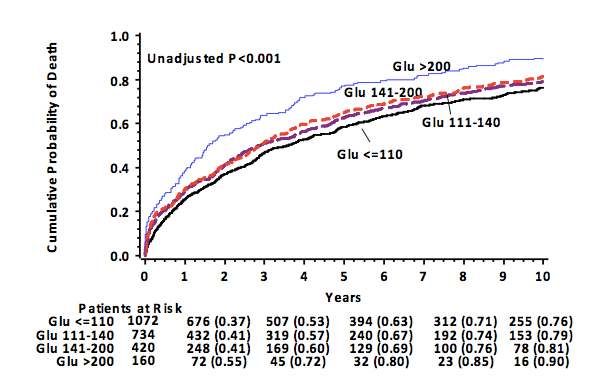
Amission Blood Glucose and Long Term (10-year) Mortality among Patients Hospitalized with Heart Failure
2Department of Cardiology, Rabin Medical Center, Petah-Tikva
3Heart institute, Sheba Medical Center, Tel-Hashomer
Background: High admission blood glucose (ABG) level has been associated with a poor short-term outcome among non-diabetic patients with heart failure. The present study was designed to investigate the association between ABG levels and long-term (10 years) mortality in patients with or without pre-existing diabetes mellitus (DM) admitted with heart failure (HF).
Methods: We analyzed data on 1990 patients with DM and 2340 patients with no pre-existing DM who were hospitalized for HF during a prospective national survey. The relationship between ABG and 10-year mortality was assessed using the Cox proportional hazard model adjusting for multiple variables. ABG was analyzed both as a categorical (<110, 110-140, 140-200, and >=200 mg/dL) and as a continuous variable.
Results: At 10 years of follow up the cumulative mortality rates were 88.2% and 80.6% among DM and no pre-existing DM patients (p<0.001). Among patients with no pre-existing DM, mortality risk correlated with admission glucose levels (Figure); whereas there were no significant differences in the cumulative mortality rates among the ABG subgroups in DM patients (p log rank =0.245).
Multivariable analyses showed that each 18-mg/dL (1-mmol/L) increase in glucose level was associated with a 5% increased risk of mortality (p<0.001) among patients with no pre-existing DM. In contrast, among DM patients, only those with ABG >=200 had an increased mortality risk (>=200 vs.
Conclusions: Among patients without pre-existing DM there is a linear relationship between ABG and long-term mortality, whereas among DM patients only ABG >200 mg/dl is associated with increased mortality risk.

Powered by Eventact EMS